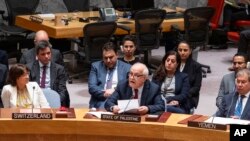The U.N. Security Council began reviewing the Palestinians’ renewed bid for full United Nations membership on Monday, despite long-standing U.S. policy that would likely lead to a veto in the council.
“Our position is a position that is known; it hasn’t changed,” U.S. Ambassador Linda Thomas-Greenfield told reporters following a meeting of the Security Council committee that is considering the Palestinian application.
For decades, Washington has said Palestinian statehood — and, thus, full U.N. membership — is a final status issue that should be negotiated between the Israelis and Palestinians as part of a two-state solution.
Thomas-Greenfield said the U.S. is engaging “actively and cooperatively” with the admissions committee, adding that Washington wants to find a path to a two-state solution that would provide peace for the Israelis and a state for the Palestinians.
U.N. membership goes through the Security Council, where Washington holds a veto. It is up to the 15-nation council to recommend admission to the General Assembly, which would then vote on it. A two-thirds majority vote is necessary in the General Assembly for admission of a new state.
In September 2011, the Palestinian Authority submitted its initial application for full membership, but the application never made it to a vote in the U.N. Security Council.
After that bid stalled, the Palestinians sought and received an upgrade in status the following year at the General Assembly to “non-member state.” They still cannot vote, but it allowed them to become a party to treaties that are deposited with the U.N. secretary-general and join U.N. bodies like the World Health Organization and the International Criminal Court.
In a letter to the U.N. last week, the Palestinian Authority requested that the 2011 application be given renewed consideration this month.
“We sincerely hope, after 12 years since we changed our status to an observer state, that the Security Council will elevate itself to implementing the global consensus on the two-state solution by admitting the state of Palestine for full membership,” Palestinian envoy Riyad Mansour told reporters.
The council’s committee on the admission of new members took up the issue Monday afternoon behind closed doors. The committee is tasked with deciding whether the territory known as Palestine meets the criteria for statehood, including possession of a defined territory and a recognized government. Under the U.N. Charter, a new member must also be “peace-loving.”
“The Palestinian Authority is the exact opposite of a peace-loving entity,” Israel’s U.N. envoy, Gilad Erdan, told reporters.
He said an agreement on a Palestinian state could only be reached at the negotiating table, not forced unilaterally on Israel at the United Nations.
Following the committee meeting, council president Ambassador Vanessa Frazier of Malta told reporters that the initial discussions were “very frank,” and a second meeting is tentatively planned for Thursday.
Khaled Elgindy, senior fellow at the Washington-based Middle East Institute and director of the Program on Palestine and Palestinian-Israeli Affairs, told VOA that the Palestinian move is unlikely to be successful.
“I think the outcome is already known — the U.S. will veto it — if it even comes to a vote,” he said. “They will do whatever they can to even prevent a vote from happening in the Security Council. But a U.S. veto is virtually assured.”
There is also U.S. legislation from the 1990s that would require Washington to stop funding the United Nations if they “grant full membership as a state to a group that does not have the internationally recognized attributes of statehood.” Loss of U.S. funding would be catastrophic for the world body.
“At the end of the day, it’s a big nothing burger, because it changes nothing. It will go nowhere, and it just points to the kind of growing irrelevance and bankruptcy of the leadership of [PA President] Mahmoud Abbas,” Elgindy said.
Abbas and the Palestinian Authority are under growing U.S. pressure to reform. Last month, Abbas appointed his long-time economic adviser, Mohammed Mustafa, to be the next prime minister. He will need to put together a government that will be able to reunite Palestinian factions in the West Bank and the Gaza Strip and help rebuild and govern Gaza after the war between Israel and Hamas ends.




